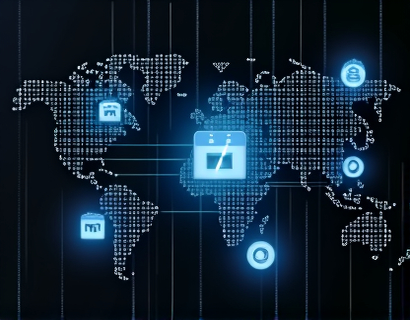Revolutionizing User Engagement: The Synergy of Crypto and AI in Intelligent App Ecosystems
The integration of cryptocurrency and artificial intelligence (AI) is ushering in a new era of digital innovation, particularly in the realm of app ecosystems. This fusion is not only transforming how users interact with digital platforms but also driving unprecedented growth and engagement in the tech sector. As technology continues to evolve, the synergy between these two cutting-edge fields is becoming increasingly evident, offering a glimpse into a future where digital experiences are more personalized, secure, and rewarding.
The traditional app ecosystem has been primarily driven by centralized entities that control user data and interactions. However, the advent of blockchain technology and AI is disrupting this model, creating a more decentralized and user-centric environment. This article delves into how the combination of cryptocurrency and AI is revolutionizing user engagement, enhancing digital experiences, and fostering innovation within app ecosystems.
Decentralization and User Ownership
One of the most significant impacts of blockchain technology is the concept of decentralization. Unlike traditional systems where data is stored in centralized servers, blockchain distributes data across a network of nodes, ensuring transparency and security. This decentralization empowers users by giving them control over their data and digital assets. In the context of app ecosystems, this means users can own and manage their digital identities and assets without relying on intermediaries.
Cryptocurrency plays a crucial role in this decentralized model by serving as a medium of exchange within the app ecosystem. Users can earn, trade, and utilize digital tokens to access premium features, participate in governance, and even monetize their data. This shift from a permissioned to a permissionless system not only enhances user autonomy but also fosters a more inclusive and dynamic community.
AI-Driven Personalization
AI technology is a game-changer when it comes to personalizing user experiences. By analyzing vast amounts of data, AI algorithms can understand user preferences, behaviors, and needs, enabling apps to provide tailored content and services. In a decentralized app ecosystem, AI can be used to create intelligent agents that interact with users in a more human-like manner, offering recommendations, assistance, and insights.
For instance, an AI-powered chatbot within a decentralized app can learn from user interactions to improve its responses over time. This not only enhances user satisfaction but also increases engagement and retention. Moreover, AI can help in identifying patterns and trends within the user base, allowing developers to make data-driven decisions to optimize the app ecosystem.
Enhanced Security and Privacy
Security and privacy are paramount concerns in the digital world, and the combination of cryptocurrency and AI offers robust solutions. Blockchain's inherent security features, such as cryptographic hashing and consensus mechanisms, ensure that user data is protected from unauthorized access and tampering. AI, on the other hand, can be employed to detect and mitigate potential security threats in real-time.
For example, AI-driven anomaly detection systems can monitor network activity and identify suspicious patterns that may indicate a security breach. By integrating these technologies, app ecosystems can provide a higher level of security and privacy, building trust among users and encouraging greater adoption.
Tokenization of Assets and Incentives
Tokenization is another key aspect of the crypto-AI synergy in app ecosystems. By tokenizing various assets, such as content, services, and even user contributions, apps can create a more dynamic and rewarding environment. Tokens can be used to incentivize users to contribute value, such as creating high-quality content, providing feedback, or participating in community governance.
These tokens can also serve as a form of digital currency within the app, allowing users to purchase premium features, access exclusive content, or even trade with other users. This token-based economy not only motivates users to engage more deeply with the app but also creates a self-sustaining ecosystem where value is continuously generated and distributed.
Smart Contracts and Automated Governance
Smart contracts, self-executing contracts with the terms directly written into code, are a powerful tool in decentralized app ecosystems. They automate processes, ensure transparency, and reduce the need for intermediaries. In the context of AI-driven apps, smart contracts can be used to implement automated governance mechanisms.
For example, AI can analyze user feedback and community votes, and smart contracts can execute decisions such as updating app features, distributing tokens, or adjusting pricing models. This level of automation not only streamlines operations but also ensures that the app ecosystem remains responsive to user needs and preferences.
Data Monetization and User Empowerment
In a decentralized app ecosystem, users have the power to monetize their data. By leveraging blockchain and AI, users can control how their data is used and even earn rewards for sharing it. This shift from data being a commodity controlled by corporations to a resource owned and managed by individuals is a significant empowerment tool.
AI can enhance this process by providing users with insights into how their data is being used and offering options to sell or trade it. For instance, an AI-powered platform can aggregate user data (with explicit consent) and sell it to relevant businesses, with users receiving a share of the revenue. This not only generates additional income for users but also creates a more transparent and fair data economy.
Fostering Innovation and Collaboration
The intersection of cryptocurrency and AI is not only transforming existing app ecosystems but also fostering a culture of innovation and collaboration. Developers and entrepreneurs are encouraged to build on open-source platforms, share knowledge, and collaborate on projects that leverage these technologies. This collaborative environment accelerates the development of new features and services, leading to a more vibrant and dynamic tech landscape.
Moreover, the use of blockchain and AI in app ecosystems promotes interoperability, allowing different apps and platforms to seamlessly integrate and communicate with each other. This interconnectedness opens up new possibilities for users, who can enjoy a more cohesive and versatile digital experience across various services.
Challenges and Considerations
While the potential benefits of combining cryptocurrency and AI in app ecosystems are substantial, there are also challenges and considerations to address. Regulatory uncertainty remains a significant hurdle, as governments worldwide are still grappling with how to regulate these emerging technologies. Ensuring compliance while maintaining the decentralized and innovative nature of these systems is a delicate balance.
Additionally, the technical complexity of integrating blockchain and AI requires skilled developers and a deep understanding of both fields. Education and training programs will be essential to build a workforce capable of developing and maintaining these advanced systems. User adoption is another critical factor, as the success of these technologies depends on widespread acceptance and usage.
Conclusion
The fusion of cryptocurrency and AI is revolutionizing user engagement in app ecosystems, creating a more decentralized, personalized, secure, and rewarding digital experience. By leveraging these cutting-edge technologies, app developers can build ecosystems that not only meet current user needs but also anticipate future trends. As the tech landscape continues to evolve, the synergy between crypto and AI will undoubtedly play a pivotal role in shaping the next generation of digital innovations.










































